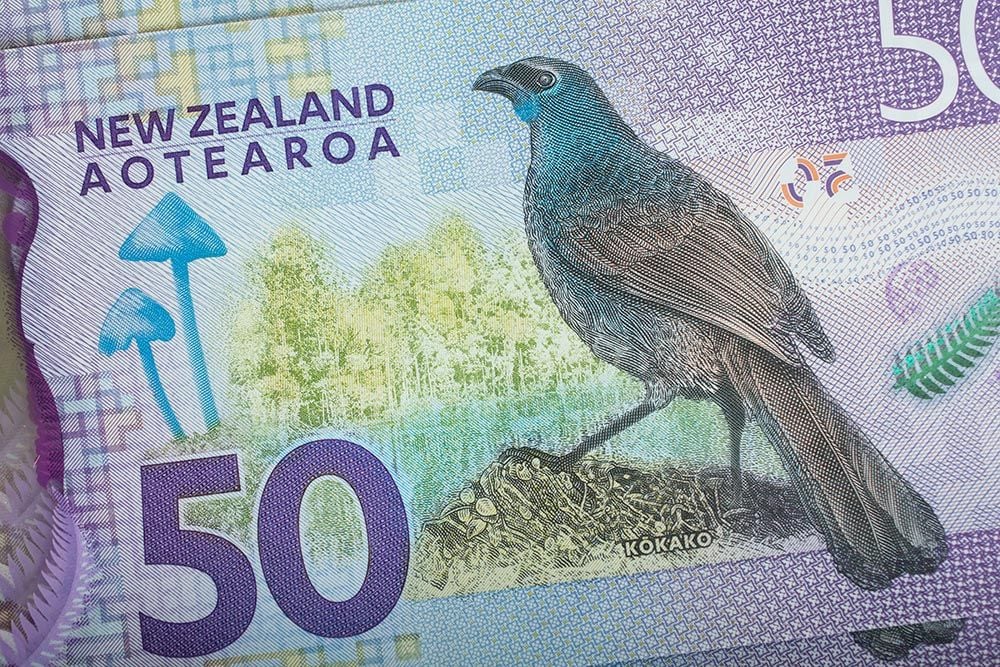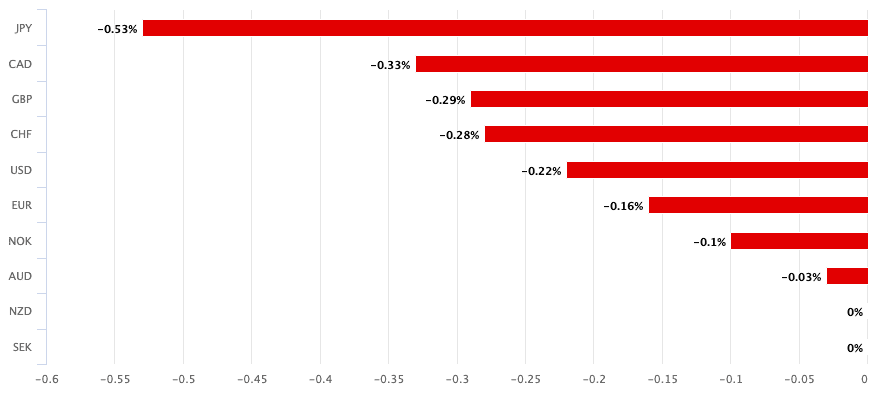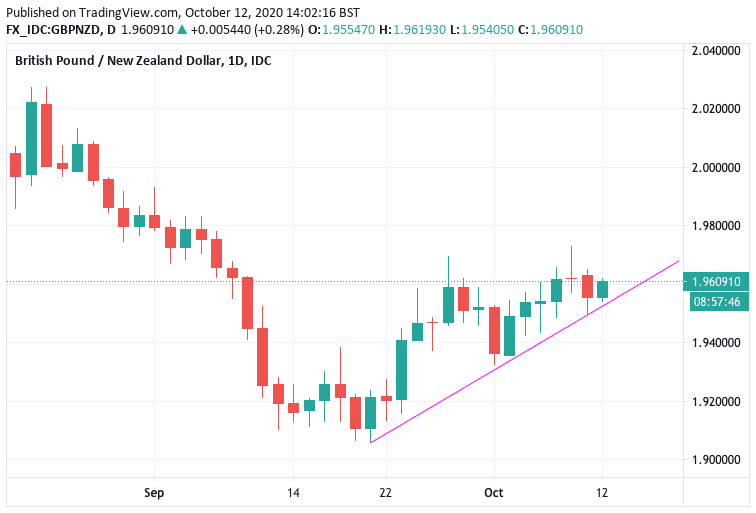New Zealand Dollar Weighed Down by Gravitational Pull of the Aussie and Yuan
- GBP/NZD short-term uptrend intact
- NZ elections due on Saturday
- NZD weighed down by AUD and CNH sell-off

Image © Adobe Stock
- GBP/NZD spot rate at time of publication: 1.9595
- Bank transfer rates (indicative guide): 1.8909-1.9046
- FX specialist rates (indicative guide): 1.9350-1.9419
- More information on specialist rates here
The New Zealand Dollar was the worst-performing major currency at the start of the new week, going lower against all its G10 peers in sympathy with its Australian cousin which was in turn impacted by developments in the Chinese financial system.
Declines in the New Zealand Dollar come amidst a sell-off in the Chinese Yuan, expectations for negative interest rates at the Reserve Bank of New Zealand (RBNZ) and as the clock counts down to this weekend's New Zealand general election, although analysts say the currency is unlikely to suffer to greatly given the limited prospect of a sea-change in domestic policy.
There appears to be a strong linkage in the New Zealand Dollar's underperformance at the start of the week with that of the Australian Dollar, which is the second-worst performing major of the day amidst developments in the Chinese financial system.
Both the antipodean dollars fell amid steep losses in the Chinese Yuan after Chinese regulators scrapped a rule requiring local lenders to set aside capital when dealing in Yuan forwards on behalf of clients.
It appears the move forms an attempt by Chinese authorities to soften the pace of appreciation in Yuan exchange rates following months of gains driven by the robust recovery in the world's second-largest economy.
"The removal of the 20% requirement will allow market participants to short CNH. The rule change comes after the CNH rose to its highest level since April 2019," says Kim Mundy, a strategist at Commonwealth Bank of Australia.
The linkage between Australia and China is strong owing to the trade in raw materials such as iron ore, copper and gold, and given the linkage between New Zealand with both China and Australia, the New Zealand Dollar is potentially underperforming courtesy of it occupying the same basket.
The Pound-to-New Zealand Dollar rallied 0.36% to reach 1.9624 at the time of writing, ensuring that the technical uptrend intact since September 21 remains intact:
The technical configuration in the GBP/NZD exchange rate advocates for further gains with momentum readings being positive, with little resistance seen until the August highs towards 2.0 come back into play. Those with NZD payment requirements who would like to automatically book an ideal rate when it is reached, please learn more here, alternatively you can lock in today's rates for future use if you are looking to protect your international payments budget.
Elsewhere, New Zealand Dollar weakness is being reflected in a softer EUR/NZD exchange rate which is 0.21% higher at 1.7762 and the NZD/USD exchange rate which is 0.20% lower at 0.6648.

It is not just the linkage with China and Australia that is aiding NZ Dollar losses, domestic considerations in the form of the RBNZ are at the forefront of investors' minds.
"Market participants continue to price more easing by the RBNZ but are mindful of ignoring risks of earlier/aggressive easing; especially as they anticipate an FLP program in the November MPC meeting and rate cuts in Q2 2021," says Nikolaos Sgouropoulos, a foreign exchange strategist at Barclays.
Last week, the RBNZ provided additional indications that it is seriously moving towards negative rates last week, despite later announcing they will taper their bonds purchases for a third straight week.
RBNZ Chief Economist Ha said that the bank would "rather be aggressive with stimulus" and "do too much too soon than too little too late."
Ha said the RBNZ is currently considering a tiering regime for the negative interest rate plan.
The negative impact of expectations for negative interest rates was highlighted in Augusts nonresident bond holding data, which showed NZD1.4BN flowed out of New Zealand in August. Foreign investors no longer expect New Zealand bonds to offer competitive returns in a negative interest rate environment, and are shifting their capital elsewhere.
The domestic agenda is further clouded by Saturday's general election where Prime Minister Jacinda Ardern’s Labour party is expected to win a majority of seats, although some pundits warn a coalition government will be the most likely outcome.
"The upcoming elections will hardly play a key role for the currency, as polls suggest incumbent PM Jacinda Ardern should get a relatively comfortable win on 17 October. There is a chance Ardern’s party will get a majority in the parliament, but even if they were to fell short of the 61-MPs mark, a deal with the Green Party (which could get around 8 seats) should ensure stability," says Francesco Pesole, a foreign exchange strategist at ING Bank.
Despite the declines at the start of the new week, foreign exchange strategists are not convinced the currency is at risk of a significant sell off.
Sgouropoulo says "recent NZD underperformance could stall," as an improvement in global investor sentiment could aid the currency higher.
This view is shared by ING's Pesole who says:
"With the RBNZ dovishness largely in the price and the data calendar offering very little inspiration, we should hardly see NZD drift away from the general risk sentiment dynamics."





